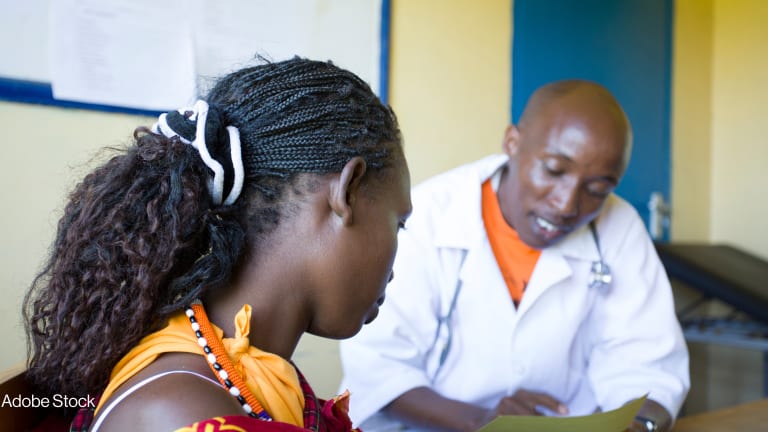Q&A: Peter Piot on grand challenges in research, education and training for global health
The easy gains are over, with issues such as chronic conditions, urbanization and climate change demanding a new way of doing business.
As Peter Piot considers the future of global health, he has decades of experience to draw on, spanning back to before the term even existed. So when he talks about global health 2.0, as he did recently at an event at the University of Washington, people pay close attention. The director of the London School of Hygiene and Tropical Medicine, who is widely known for his role in helping discover the Ebola virus before becoming the founding executive director of UNAIDS, emphasized a few shifts he hopes to see. “We’ve been very good at what I would call supply side innovation,” he said. “But where we’ve really paid less attention is what I call demand side innovation.” While he said he does not like the term delivery, he emphasized the need to expand beyond prioritizing delivery of innovation to focus on innovation of delivery — inspiring this Devex story on the topic. The easy gains are over, he said, explaining that issues like chronic conditions, urbanization and climate change demand a new way of doing business. Here are highlights from his conversation with Devex, edited for length and clarity. “Health professionals like me should team up with colleagues in other sectors to address the problems we are trying to solve. With chronic diseases, it is a lot to do with food, but also with the environment, urban planning, and so on.” --— Peter Piot, director of the London School of Hygiene and Tropical Medicine You recently gave a talk at the University of Washington on grand challenges for the next decade in global health research, education and training. What was the message you wanted the audience of global health professionals to walk away with? The message was a triple one. First, there is still a huge unfinished agenda. Infectious diseases are still not under control. There is still maternal mortality, malnutrition, etc. So we should make sure we don’t neglect all of that, and that we continue the work. Secondly, there are big, new challenges ahead, and they are driven by demographic change, aging populations and the growing incidence of chronic conditions. And they’re far more complicated and complex to address. There’s no vaccine against obesity or diabetes. And thirdly, we have the big environmental issues related to climate change, urbanization, migration and environmental issues, such as the horrific pollution in Indian and Chinese cities for example. What’s the long term impact on health for that? The way we work has to change. The solutions are not so much in the health sector. For the classic problems we have in infectious disease, we often have quite precise targeted interventions and tools we can apply. Chronic diseases is something in between. And in order to make a difference when it comes to the impact of climate change on health, we need to team up with other sectors. Two examples come to mind. One is road traffic accidents. I was in Cambodia last year, and what was striking to me is, with all the motorcycles, some people don’t wear helmets. So what’s the solution? You need to enforce helmets, restrict speed limits, stop driving under influence — sealtbelts and all that are not really a health issue — but there is a major impact on health. Another area that is more directly to do with health is smoking. One of the success stories of public health, at least in high income countries, is that smoking rates have gone down tremendously. And that’s not through a medical or health intervention. It’s banning smoking in bars and restaurants, in the workplace, in planes. So we, meaning health professionals like me, should team up with our colleagues in other sectors to address the problems we are trying to solve. With chronic diseases, it is going to be a lot to do with food, but also with the environment, urban planning, and so on. You mentioned urban planning. There seems to be a connection with smart cities here. What’s your take on the impact smart city planning could have on this intersection of health and environment? “We don’t always think of the health implications of smart cities but smart cities are the key to better health for urban populations for the future.” --— Peter Piot, director of the London School of Hygiene and Tropical Medicine The health issues for urban populations are quite different from those in rural populations. In some respects, there are negative impacts on health, for example more sexually transmitted infections and higher rates of stress. But in other respects, there are more opportunities, because people are much easier to reach. Cities have a negative impact on the environment because the concentration of pollutants only promotes climate change. They can also increase chronic diseases because people are not as physical. But if you have a better designed city, you can have double the impact. Healthier living, whether it’s eating less meat or taking more public transportation, will reduce the impacts of climate change, and lead to a decline in chronic diseases. We don’t always think of the health implications of smart cities but smart cities are the key to better health for urban populations for the future. One line that really resonated from your talk at the University of Washington was the need for innovation of delivery in addition to delivery of innovation. How can the global health community make that shift? To reach universal health coverage, and to deliver all the great tools and interventions that exist, we must have another business model that is based on direct interaction. For example, Population Services International doesn’t drop condoms or bed nets in a health center and then wait until people come and pick them up or pay for them. They use direct marketing to reach people. We have an enormous challenge of going to scale and accelerating health improvements. It won’t be possible without different modes of delivery. We have much better vaccines and drugs and interventions but they’re pretty useless if they stay on the shelf. Technology will allow us to leapfrog in one way, but it’s also about different delivery modes, so that’s the innovation we need and that’s outside the normal biomedical knowledge. I mentioned social marketing, but it’s also task shifting, because if people who are less professionally qualified can be trained to do specific tasks, that is not only cheaper but there will also be far more people that can be reached. We’re only at the beginning of two new revolutions. One is the miniaturization of new tools. Computers used to fill the whole room, and now we have more capability in our smartphones than those first computers. You can do an ultrasound by taking your smartphone over the belly of a pregnant woman. The other is the use of smartphones, from simple applications such as sending texts to remind people to take their drugs, to the growth of wearables and sensors. We’re really at the beginning. Here at our school, PhD students have developed a smartphone app, where you put a smartphone in front of your eye and it takes on some of the same tasks of an ophthalmologist. In many countries, there are very few ophthalmologists and they’re mostly doing private practice. That’s a good example of where you can use new technology to reach more people, so that’s also innovation of delivery. Technology can help with innovation of delivery. But it’s about more than just technology. It’s also how do we organize? When you look at sub-Saharan Africa, there’s a huge deficit of health care workers. And it will take probably several decades to train enough people. So we need to do something that uses other delivery and management models. The role of a well-trained physician changes from doing it all themselves to ensuring quality and training people. That’s quite a behavior change from the side of the classic health care provider. What advice do you have for members of our audience who get the importance of innovation of delivery but might be stuck in systems focused on delivery of innovation? “I’m quite optimistic that this kind of innovation has a better chance in Africa and Asia than in high income countries, because there may be fewer deeply entrenched interests.” --— Peter Piot, director of the London School of Hygiene and Tropical Medicine I’m sure that many practitioners are overworked, overwhelmed and struggling on a daily basis with “How do I cope with this workload? How can I reach more people? How can I improve the quality?” Analyze the situation and then think out of the box. Don’t assume the way your service, your institution, your NGO is organized is the only way that’s possible. We have to be realistic. There’s can be great resistance to change. That’s often because of power. But I’m quite optimistic that this kind of innovation has a better chance in Africa and Asia than in high income countries, because there may be fewer deeply entrenched interests. We’re at the beginning of how to do what I hope will be new ways of thinking and new ways of working. For more Devex coverage on global health, visit Focus On: Global Health
As Peter Piot considers the future of global health, he has decades of experience to draw on, spanning back to before the term even existed. So when he talks about global health 2.0, as he did recently at an event at the University of Washington, people pay close attention. The director of the London School of Hygiene and Tropical Medicine, who is widely known for his role in helping discover the Ebola virus before becoming the founding executive director of UNAIDS, emphasized a few shifts he hopes to see.
“We’ve been very good at what I would call supply side innovation,” he said. “But where we’ve really paid less attention is what I call demand side innovation.”
While he said he does not like the term delivery, he emphasized the need to expand beyond prioritizing delivery of innovation to focus on innovation of delivery — inspiring this Devex story on the topic. The easy gains are over, he said, explaining that issues like chronic conditions, urbanization and climate change demand a new way of doing business. Here are highlights from his conversation with Devex, edited for length and clarity.
This story is forDevex Promembers
Unlock this story now with a 15-day free trial of Devex Pro.
With a Devex Pro subscription you'll get access to deeper analysis and exclusive insights from our reporters and analysts.
Start my free trialRequest a group subscription Printing articles to share with others is a breach of our terms and conditions and copyright policy. Please use the sharing options on the left side of the article. Devex Pro members may share up to 10 articles per month using the Pro share tool ( ).
Catherine Cheney is the Senior Editor for Special Coverage at Devex. She leads the editorial vision of Devex’s news events and editorial coverage of key moments on the global development calendar. Catherine joined Devex as a reporter, focusing on technology and innovation in making progress on the Sustainable Development Goals. Prior to joining Devex, Catherine earned her bachelor’s and master’s degrees from Yale University, and worked as a web producer for POLITICO, a reporter for World Politics Review, and special projects editor at NationSwell. She has reported domestically and internationally for outlets including The Atlantic and the Washington Post. Catherine also works for the Solutions Journalism Network, a non profit organization that supports journalists and news organizations to report on responses to problems.








